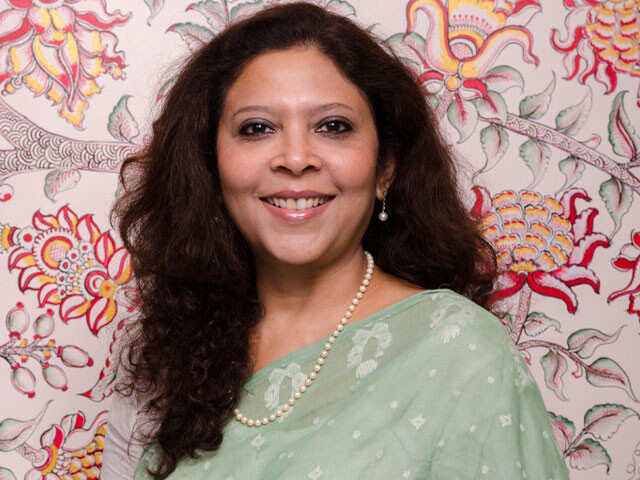
While the world went into lockdown owing to the global pandemic giving rise to home cooks and never-seen-before digital phenomena, an estimated 200 million artisans of the country faced despair due to mass closure, causing an entire ecosystem to be halted, including designers who work with these artisans. There was loss of income, no logistics support and great deal of uncertainty and stress. Artisans and their families were falling sick and many were critically ill and did not survive the pandemic. They had no idea where to look for support or even get information of any kind of help available.
At such a time, when Shibani Jain, Founder & CEO, Baaya Design, sat one afternoon in April 2020 deliberating on how the pandemic was going to impact her business, in her own words, “an epiphany happened” and she started thinking of the out-of-work artisans. She reflected that she need not think about this problem all by herself. It would be a great idea to understand what others in the industry were thinking. “On an impulse, I set up a WhatsApp group of about 40 designers and architects who were from this industry, (though I was apprehensive that yet another WhatsApp group would be called out),” she remembers. But, in almost no time, something incredible happened. The group grew spontaneously to over 250 members to chat about integrating Indian handicrafts into the ever-evolving décor industry to support livelihoods. Over time, interior and craft designers, architects, not for profits, members from corporate houses, educationists and media specialists from all corners of India, joined the group to share the same concern and ideate on what they can do collectively. “It was as if people were just waiting for this initiative to happen!” she chimes.
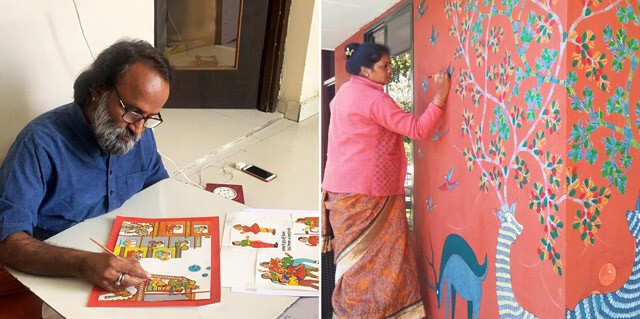 The artisans at work: phad art (left) and gond painting (right)
The artisans at work: phad art (left) and gond painting (right)
That is how Hand for Handmade (HFH) came together in a moment of crisis and has now taken on a life of its own. What was created in April 2020 as a short-term group, to discuss business issues, can now be termed as a collaborative movement to help the industry. While Jain is the Founder & Director, Ashok Chatterjee, Ex-Director, National Institute of Design (NID) and Advisor to Crafts Council of India, and Jaya Jaitley, Founder of Dastkaari Haat have been involved as mentors in this project so far.
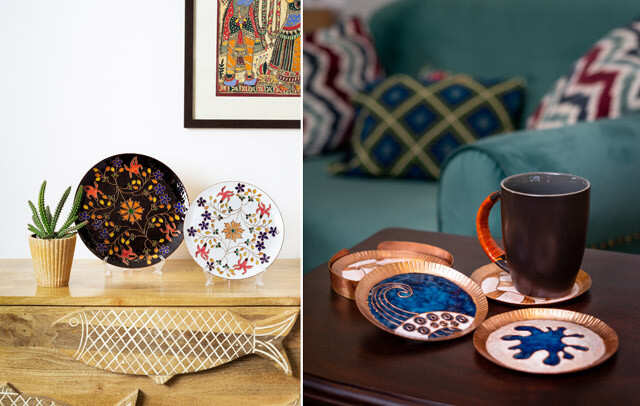 Some of the creations: Copper enamel dhokras (left) and coasters (right)
Some of the creations: Copper enamel dhokras (left) and coasters (right)
Even though it is supposed to be the second largest employment generator after agriculture, Jain feels that the handicrafts industry has been overlooked time and again and dismissed as an unstructured one. And the difficulties were only mounting. This is where Hand for Handmade came into the picture. An alumnus of NID Ahmedabad, having worked extensively with Indian arts and crafts for over two decades and being associated with craft groups across the country, was able to mobilise the group into action and get connects in place between the artisans and the opportunities. “The group has already had many positive spin offs. Cross selling opportunities, technical and marketing platforms offering help to artisan communities, designers and members who are faced with the crisis,” she informs.
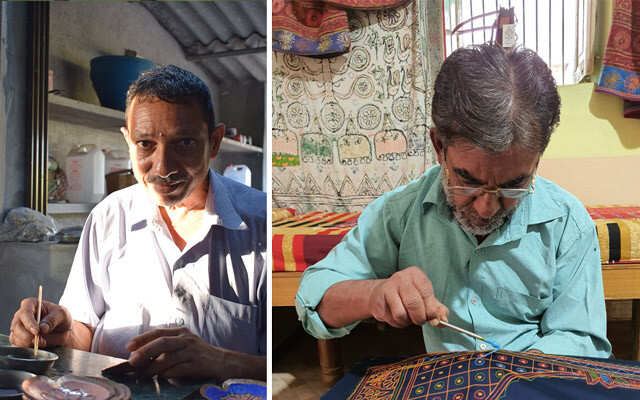 The artisans at work: copper enamel (left) and rogan embroidery (right)
The artisans at work: copper enamel (left) and rogan embroidery (right)
Despite what one might think about how difficult it is to keep the traditions of certain crafts alive when the competition with machine made pieces (especially cost-wise) is tough, Jain informs otherwise. She mentions that the energy in the group remains infectious. Over a hundred core volunteers are working to create various synergies. “Two main groups have been formed to look at various aspects of meeting our goals. The first group will look at scaling select craft communities by handholding them through mitigating various challenges to their growth. The second group will look at addressing design student communities and build visibility for HFH members. Some seed funding and collaborative opportunities have already taken off with supporting individuals and companies. A dedicated professional team has been put in place to kick start and organise the volunteering, funding and other activities,” she adds.
All of this has been possible as HFH has formalised as a collective group of over 500 professional individuals and organisations. It is now registered as a Section 8 company, the Vision-Mission-Goals of which have been set across the last few weeks. A section of the industry is a part of the venture, including craft producer groups, artisans, designers, academicians, retailers, e-commerce companies and corporates.
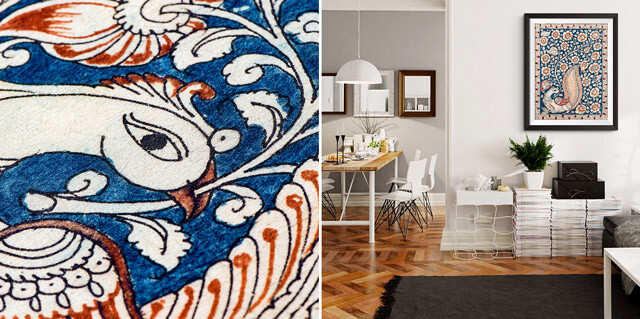 An ornate peacock in kalamkari
An ornate peacock in kalamkari
Over the formalisation of the company as well, the goal at heart remains intact – to remain dedicated to boost the cause of ‘handmade’ in India and globally through design, market, production capability and funding support. “Craft goods must be purchased not out of a sense of social duty for artisans, but because crafts are a sustainable way to create beauty in our lives, homes and spaces. It is an important connection to our own identities. Promoting native arts and crafts will not only preserve our heritage but will also protect the livelihood of the artisans, which in turn will highlight our ethnicities ,” Jain says of the ethos of the organisation. Of course, due importance can only be given to the handicrafts sector, when craft and design knowledge come together to create a vibrant industry that not only meet the needs of customers today, but also ensure that these wonderful and diverse skills exist so that our children can experience and enjoy them.
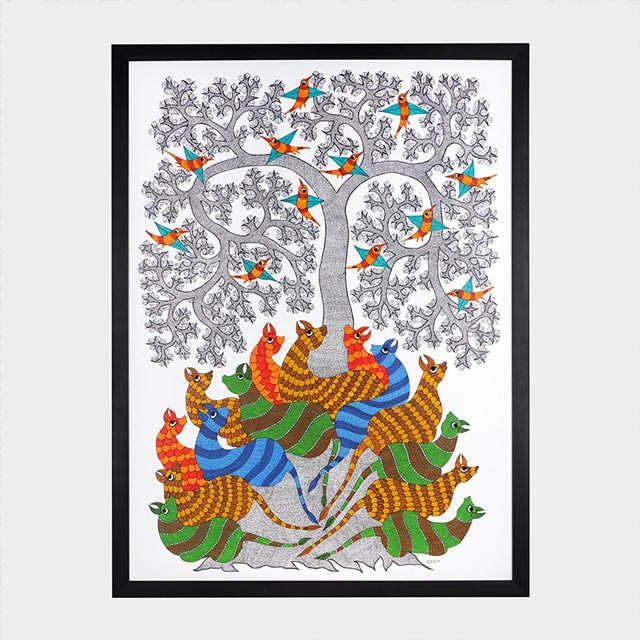 An artwork: The Sheltering Tree
An artwork: The Sheltering Tree
It is a given that handcrafted products carry an innate beauty that comes from the human touch. Artisans who have perfected skills across generations bring soul and a natural fluidity through their artisanship. When you use a handcrafted product it is the subtle variations that make the product special and unique. The products carry the grace of these expert hands and their imaginative powers. The added advantage? A large segment of handcrafted work is sustainable and meets many of the UN goals of sustainability.
As Jain sums up, “Using handmade products is to buy guilt free, be natural, soulful, supportive and sustainable in your choices as a consumer. If you wish for such a world, start buying and using handmade products.” We could not have put it better!
Also Read: Meet Iranian-Canadian Art Curator Vida Heydari Who Found Her Niche In Pune
At such a time, when Shibani Jain, Founder & CEO, Baaya Design, sat one afternoon in April 2020 deliberating on how the pandemic was going to impact her business, in her own words, “an epiphany happened” and she started thinking of the out-of-work artisans. She reflected that she need not think about this problem all by herself. It would be a great idea to understand what others in the industry were thinking. “On an impulse, I set up a WhatsApp group of about 40 designers and architects who were from this industry, (though I was apprehensive that yet another WhatsApp group would be called out),” she remembers. But, in almost no time, something incredible happened. The group grew spontaneously to over 250 members to chat about integrating Indian handicrafts into the ever-evolving décor industry to support livelihoods. Over time, interior and craft designers, architects, not for profits, members from corporate houses, educationists and media specialists from all corners of India, joined the group to share the same concern and ideate on what they can do collectively. “It was as if people were just waiting for this initiative to happen!” she chimes.

That is how Hand for Handmade (HFH) came together in a moment of crisis and has now taken on a life of its own. What was created in April 2020 as a short-term group, to discuss business issues, can now be termed as a collaborative movement to help the industry. While Jain is the Founder & Director, Ashok Chatterjee, Ex-Director, National Institute of Design (NID) and Advisor to Crafts Council of India, and Jaya Jaitley, Founder of Dastkaari Haat have been involved as mentors in this project so far.

Even though it is supposed to be the second largest employment generator after agriculture, Jain feels that the handicrafts industry has been overlooked time and again and dismissed as an unstructured one. And the difficulties were only mounting. This is where Hand for Handmade came into the picture. An alumnus of NID Ahmedabad, having worked extensively with Indian arts and crafts for over two decades and being associated with craft groups across the country, was able to mobilise the group into action and get connects in place between the artisans and the opportunities. “The group has already had many positive spin offs. Cross selling opportunities, technical and marketing platforms offering help to artisan communities, designers and members who are faced with the crisis,” she informs.

Despite what one might think about how difficult it is to keep the traditions of certain crafts alive when the competition with machine made pieces (especially cost-wise) is tough, Jain informs otherwise. She mentions that the energy in the group remains infectious. Over a hundred core volunteers are working to create various synergies. “Two main groups have been formed to look at various aspects of meeting our goals. The first group will look at scaling select craft communities by handholding them through mitigating various challenges to their growth. The second group will look at addressing design student communities and build visibility for HFH members. Some seed funding and collaborative opportunities have already taken off with supporting individuals and companies. A dedicated professional team has been put in place to kick start and organise the volunteering, funding and other activities,” she adds.
All of this has been possible as HFH has formalised as a collective group of over 500 professional individuals and organisations. It is now registered as a Section 8 company, the Vision-Mission-Goals of which have been set across the last few weeks. A section of the industry is a part of the venture, including craft producer groups, artisans, designers, academicians, retailers, e-commerce companies and corporates.

Over the formalisation of the company as well, the goal at heart remains intact – to remain dedicated to boost the cause of ‘handmade’ in India and globally through design, market, production capability and funding support. “Craft goods must be purchased not out of a sense of social duty for artisans, but because crafts are a sustainable way to create beauty in our lives, homes and spaces. It is an important connection to our own identities. Promoting native arts and crafts will not only preserve our heritage but will also protect the livelihood of the artisans, which in turn will highlight our ethnicities ,” Jain says of the ethos of the organisation. Of course, due importance can only be given to the handicrafts sector, when craft and design knowledge come together to create a vibrant industry that not only meet the needs of customers today, but also ensure that these wonderful and diverse skills exist so that our children can experience and enjoy them.

It is a given that handcrafted products carry an innate beauty that comes from the human touch. Artisans who have perfected skills across generations bring soul and a natural fluidity through their artisanship. When you use a handcrafted product it is the subtle variations that make the product special and unique. The products carry the grace of these expert hands and their imaginative powers. The added advantage? A large segment of handcrafted work is sustainable and meets many of the UN goals of sustainability.
As Jain sums up, “Using handmade products is to buy guilt free, be natural, soulful, supportive and sustainable in your choices as a consumer. If you wish for such a world, start buying and using handmade products.” We could not have put it better!
Also Read: Meet Iranian-Canadian Art Curator Vida Heydari Who Found Her Niche In Pune
Next Story